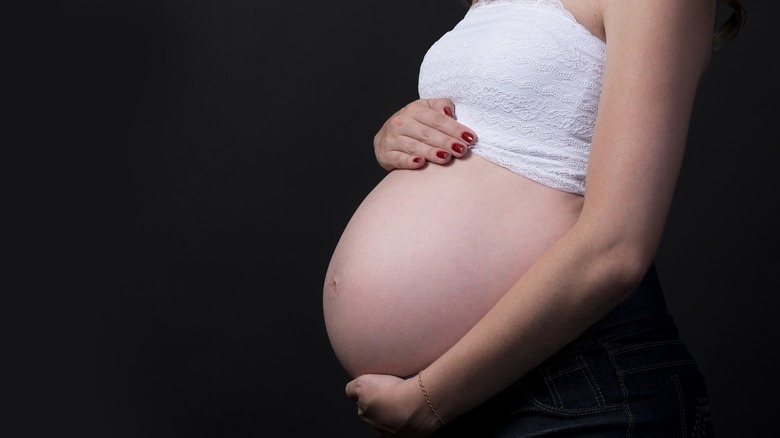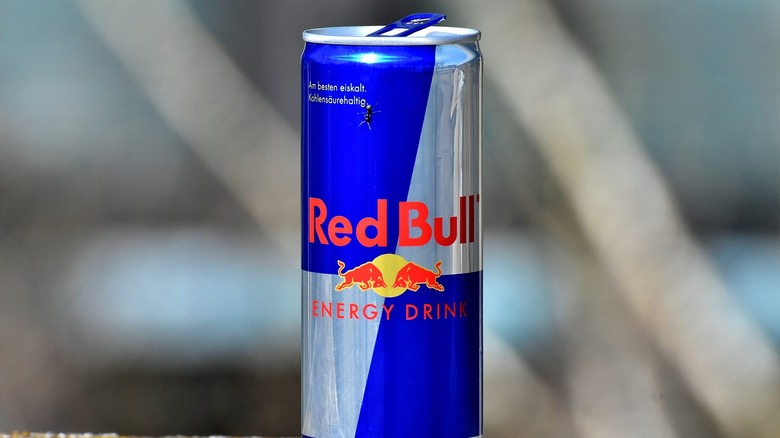Is It Safe To Drink Red Bull While Pregnant?
Energy drinks such as Red Bull have become a common stimulant for people trying to stay productive in today's society. A 2015 study published in the International Journal of Health Sciences showed that in 2013, the yearly consumption of energy drinks reached nearly 6 billion liters across 160 countries. The study also found that young people's energy drink consumption was growing, with the beverages becoming the second most common dietary supplement used by young people, with 30% drinking them regularly.
However, energy drinks are not without their risks. According to the National Center for Complementary and Integrative Health, the number of emergency room visits related to energy drinks doubled between 2007 and 2011. And one in 10 of those visits led to the patient being hospitalized. The Centers for Disease Control and Prevention reports that energy drinks like Red Bull have side effects like dehydration, anxiety, and heart-related issues, including heart failure.
That said, it seems that there can be some benefits to consuming Red Bull. Studies have shown that Red Bull and energy drink use in general can improve brain function and help people stay alert when they're tired (via Healthline). As a result, balancing out the benefits and risks of Red Bull can be a challenge for pregnant women who may be used to an energy boost during the day.
What pregnant moms need to know
Even among people who aren't pregnant, caffeine is very popular, with approximately 90% of Americans consuming it in some form every day (via Kuakini Health System). Among pregnant women, it remains popular, with a 2020 study published in Trends in Endocrinology and Metabolism revealing that 70% of women continue to consume caffeine during pregnancy. Some of the women profiled in the study consumed anywhere between 300 and 500 milligrams daily, the equivalent of three to five cups of coffee.
Energy drinks are very high in caffeine, with a 16-ounce can of Red Bull containing 143 milligrams (via the U.S. Department of Agriculture). And, as a 2008 study published in the American Journal of Obstetrics and Gynecology demonstrated, caffeine and pregnancy do not mix well. The study showed that an increased dose of daily caffeine, compared to no caffeine, was linked to a greater risk of miscarriage. In addition, a 2021 study published in Critical Reviews in Food Science and Nutrition showed a link between caffeine consumption and low birth weight.
In 2020, scientists at Tommy's Maternal and Fetal Health Research Centre at the University of Manchester released a study that showed that women who consumed energy drinks were at an increased risk for stillbirth (via the University of Manchester). In fact, they were 1.85 times more likely to have a stillbirth than women who didn't.
You can still get an energy boost while pregnant
If you're pregnant and craving caffeine, the good news is you don't have to give it up entirely (via Healthline). The American College of Obstetricians Gynecologists suggests no more than 200 milligrams of caffeine per day, generally equivalent to one or two cups of coffee.
Tea can be a good alternative during pregnancy, but there are factors to consider when it comes to both herbal and non-herbal teas (via the American Pregnancy Association). Non-herbal teas have great benefits from antioxidants, but caffeine is a concern, as the average cup of tea contains between 40 and 50 milligrams of caffeine. As for herbal teas, they are naturally caffeine-free, but there isn't enough available data on the safety of different herbs and the effect they may have on the fetus.
While that can of Red Bull may be off the table, if you're still craving a caffeine boost during the day while pregnant, talk to your doctor and figure out ways you can still perk up without harming yourself or your baby.



